Unbreakable Bond: A Twin Donates a Part of His Liver to His Brother
When Ethan Besas needed a transplant following a lifetime of battling a rare liver disease, his twin, Allen, did not hesitate to be his living donor.
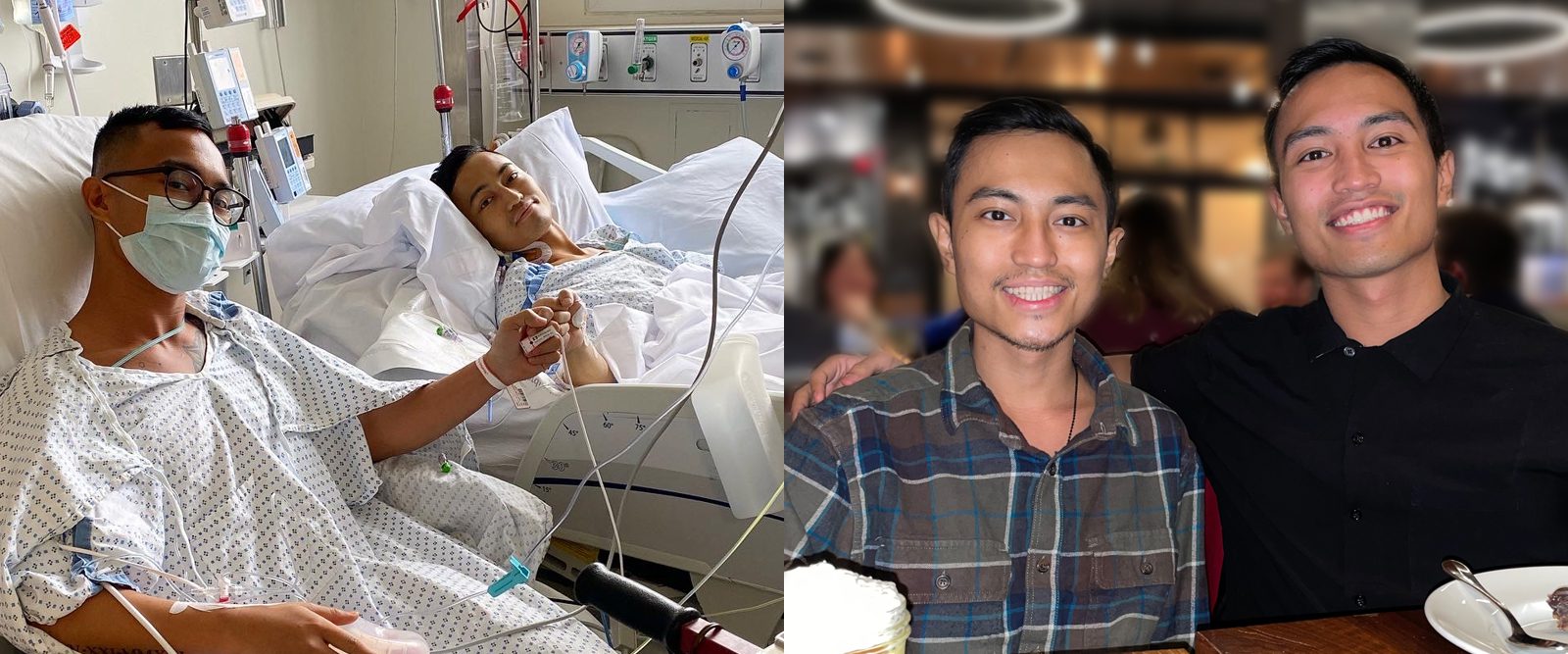
Twin brothers Ethan and Allen Besas danced down the aisle in unison, sliding and spinning to cheers from relatives and friends as they waited to walk their sister, Ella, to the altar.
The wedding was a momentous occasion for the Besas family — it was not only the start of a new life for Ella and her husband, but it was also the start of a new chapter for the twins. Just a few months earlier, Ethan had received a life-saving liver transplant from Allen.
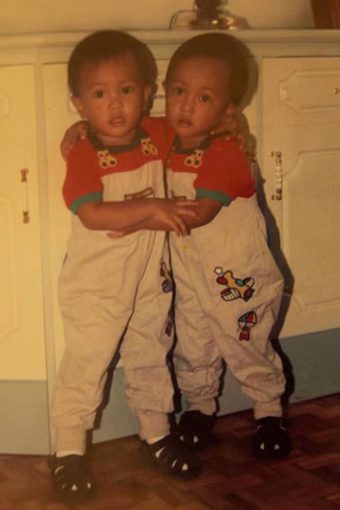
Ethan and Allen were inseparable as kids and even wore matching outfits.
In January 2023, Allen donated a portion of his liver to Ethan, who had been diagnosed in childhood with biliary atresia, a rare liver disease of the bile ducts that affects newborn infants. It was Ethan’s second liver transplant after he experienced rejection from an initial transplant he received in 2014, and the journey had been a long one for the family.
“I cried to myself thinking of the possibility of losing my twin brother,” Allen says. “And I wasn’t ready for that to be a reality. Whatever I could do, I was going to do it.”
“Allen has always been a part of me,” says Ethan. “There’s no one else in the world who understands me better. I’m blessed and grateful that he was a match.
‘A Second Birthday’
Growing up, Ethan and Allen were inseparable, wearing matching outfits as toddlers, laughing at the same jokes, and trading late-night stories in their shared room until their paths diverged when they went to different universities.
Ethan had struggled with liver issues since infancy. Biliary atresia is a disease of the bile ducts in which a portion is damaged or missing, causing bile, a fluid essential for liver function and digestion, to accumulate in the organ. This can result in scarring and liver failure.
At two months old, he underwent a Kasai procedure, a surgery where the damaged bile ducts outside the liver are replaced with a portion of the infant’s small intestine. Though not a cure, the operation can slow liver damage and delay or prevent the need for a transplant.
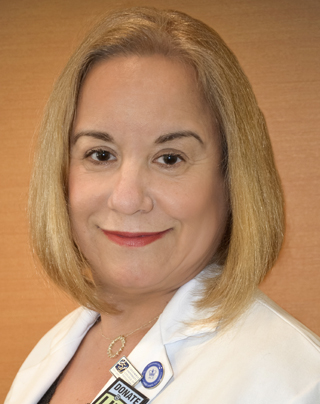
Dr. Mercedes Martinez
The procedure helped stabilize Ethan’s health for nearly 15 years, until he started experiencing complications including cholestasis, a reduction or blockage of bile flow, and intense itching caused by the higher levels of bile. The subsequent liver damage also led to swelling in the veins around his esophagus, which required several treatment procedures and monthly hospital stays.
His family brought him to NewYork-Presbyterian/Columbia University Irving Medical Center at age 16 in 2012, seeking answers.
“Ethan was experiencing a poor quality of life, and after trying interventional radiology procedures and catheters to drain the bile, it became clear that transplant would be the path forward,” says Dr. Mercedes Martinez, medical director of pediatric abdominal organ transplantation at NewYork-Presbyterian.
After nearly two years on the national transplant waiting list, Ethan, who had just turned 18, received his first liver transplant in March 2014.
“It was like a second birthday,” Ethan says.
Navigating New Challenges
The transplant was a new start for Ethan, who soon after started college, where he ran cross-country and set his sights on a career in nursing.
Through the years, he followed up with his doctors at NewYork-Presbyterian’s Center for Liver Disease and Transplantation. He participated in the Pediatric Liver to Adult Transition (PLATinum) Program, a specialized transition of care program offering education and support for young adult transplant recipients and their caregivers.
“Looking at long-term outcomes, we see our younger patients going through adolescence and moving into living as an adult with transplant, and the responsibility of that,” says Dr. Alyson Fox, Ethan’s hepatologist and medical director of the Adult Liver Transplant Program at NewYork-Presbyterian/Columbia. “As they go off to college, they just want to be normal kids. But to balance that with someone who’s also a patient and must take medications, we want to try to meet their needs and help them be an independent patient outside of their parents’ care.”
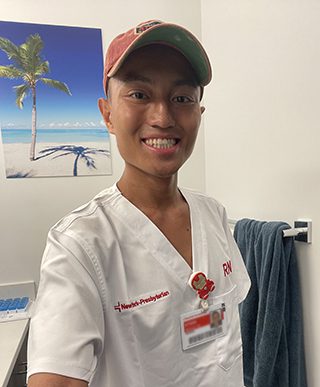
Ethan joined NewYork-Presbyterian/Weill Cornell Medical Center as a nurse in 2020.
In 2020, Ethan became more than just a longtime patient at NewYork-Presbyterian — he joined NewYork-Presbyterian/Weill Cornell Medical Center’s staff as an oncology nurse.
Amid life’s big changes, Ethan, then 26, began experiencing liver rejection in April 2022, landing him in the hospital for three weeks. Even though he got healthy enough to return to his normal routine, his care team recommended relisting him for another transplant, with discussions around the option of a living donor. His three siblings immediately underwent evaluation as potential donor candidates. His twin brother, Allen, was a match.
A Match – and Bond – Like No Other
For Allen, the decision to donate a portion of his liver to his twin came without question.
“Because our family had been dealing with Ethan’s liver condition, I had a strong understanding of Ethan’s mindset and knew he wouldn’t love the idea of putting a loved one through a liver transplant. Ethan is very selfless that way,” Allen says. “But it wasn’t something I had to weigh. I was going to do it.”
“Allen is someone who’s very caring, always supportive and there for me,” Ethan says. “I remember telling him, ‘I would prefer to be on the waiting list rather than you donate,’ but I was able to understand how to accept the help, and process that Allen just wanted me to be OK.”
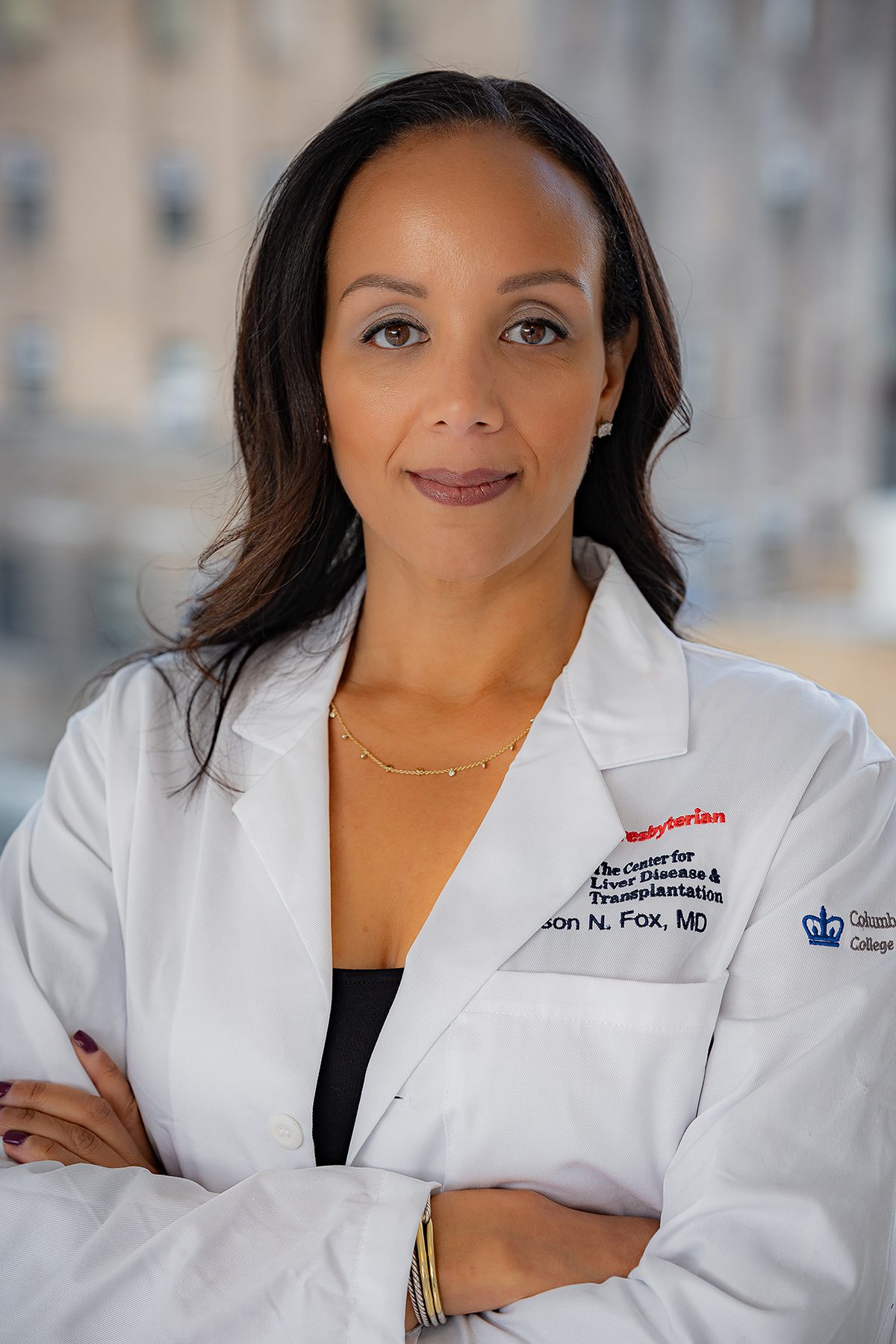
Dr. Alyson Fox
Opting for living donation afforded the Besas family the ability to schedule and prepare for the surgery. Allen, who lives in California, could plan around his job and travel, and ultimately, the twins hoped they could recover in time for their sister’s wedding.
“With living donation, there’s the possibility of earlier transplantation and faster recovery,” says Dr. Fox. “We’ve performed 500 living donor liver transplants at NewYork-Presbyterian and hope to help more patients like Ethan and Allen. What’s important about living donation is that anybody can donate — whether that’s someone in your immediate network or even an anonymous donor who comes forward to help.”
Shared Strength in Recovery
On January 17, 2023, Ethan underwent a successful liver transplant surgery, led by Dr. Tomoaki Kato, chief of transplant surgery at NewYork-Presbyterian/Columbia, and Allen underwent donor surgery in the adjacent operating room, led by Dr. Abhishek Mathur, attending surgeon at NewYork-Presbyterian/Columbia.
Allen donated 62% of his liver to Ethan, and the twins recovered on the same floor, visiting each other in the Surgical Intensive Care Unit and later walking laps together through the halls.
Months before their sister’s wedding, the twins were dancing under different circumstances — this time in Allen’s hospital room. The day of Allen’s discharge, his living donor advocate at NewYork-Presbyterian/Columbia, Sonia Scott, planned a special surprise dance party with his parents, Ethan, and Allen’s care team.
Sonia, who had provided social and educational support for Allen throughout his living donor journey at the hospital, recalled something Allen shared when he was experiencing anxiety during the process.
“Allen said, ‘I know I’m feeling better when I can dance again,’” Sonia says. “We had to do that for him.”
“All the nurses on my floor joined, people came with a cake. I really didn’t expect it,” Allen recalls. “It was special, seeing the whole floor of people who had been taking care of us for the past two weeks. It was a big milestone for our family.”
Allen twirled Sonia around as staff and family clapped and cheered, with Ethan joining in with a few of his own moves.
“The Besas’ are a family of healthcare workers — including the twins’ mother and father — who dedicate their lives to supporting others through their difficult journeys, and we hoped to pay them back and pay it forward, along with our staff who were honored to be a part of it,” Sonia says.
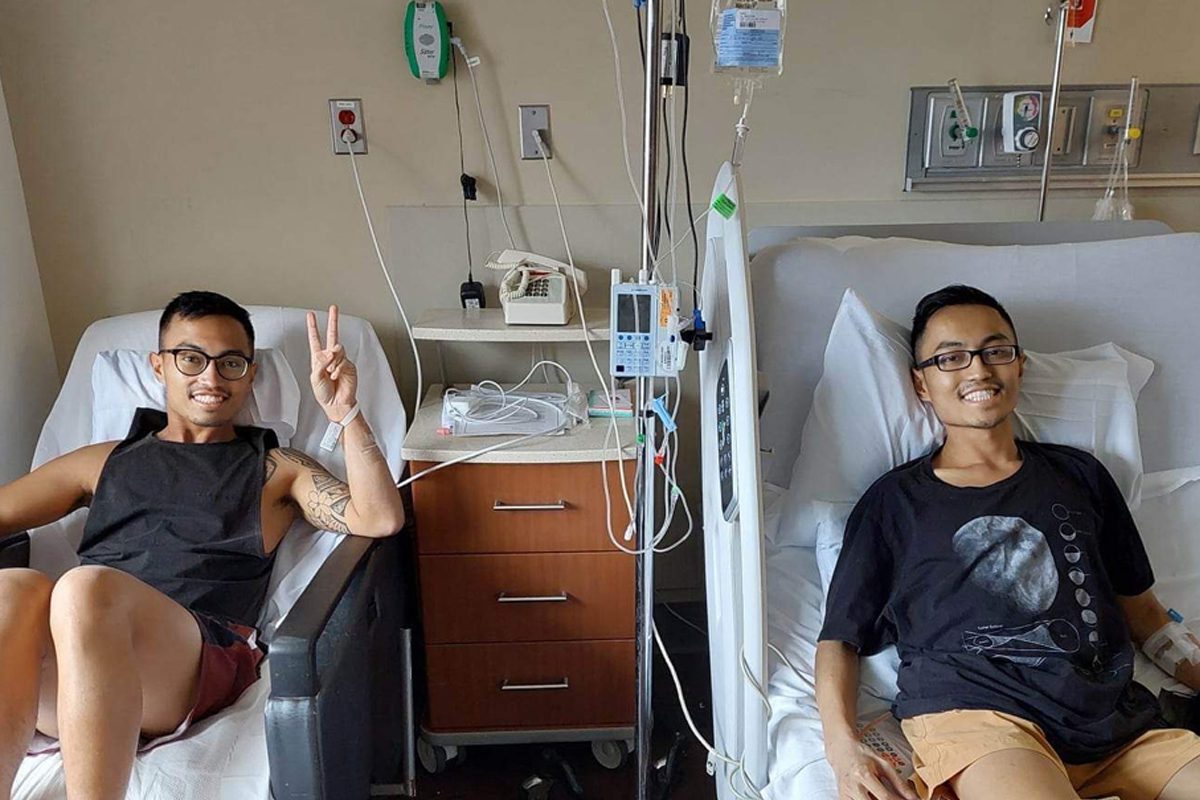
Ethan (right) and Allen (left) recovered on the same floor after a successful living donor liver transplant surgery on January 17, 2023.
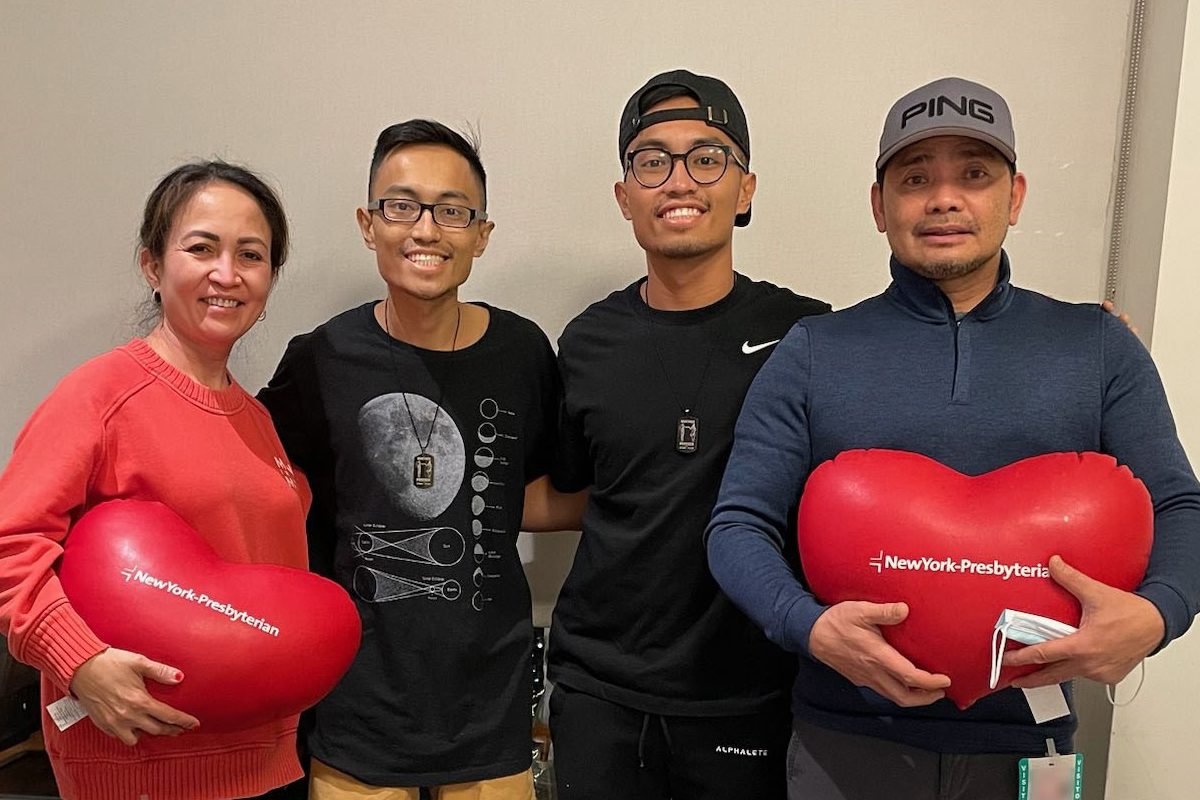
Ethan and Allen with their parents, Sibyl and Alfonso.

Five months after their transplant surgeries, Ethan and Allen were able to help walk their sister, Ella, down the aisle on her wedding day.
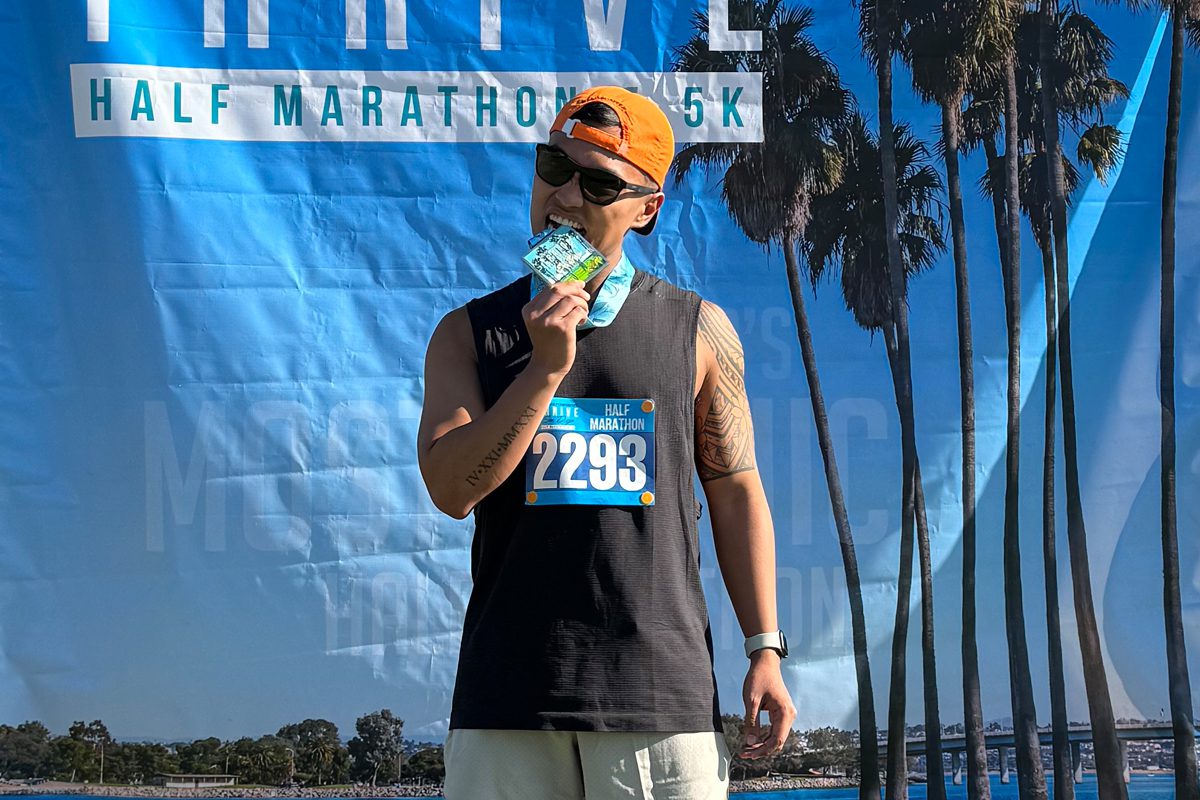
Allen reached a personal best in his half-marathon race time, months after donating a portion of his liver to his brother.

Six months after his second liver transplant, Ethan returned to indoor climbing.
The Next Chapter
After a few complications in their recovery — Ethan was readmitted for an infection and unrelated kidney stone, while Allen recovered from a partial small bowel obstruction — the twins were looking forward to being home and celebrating with Ella in a few months.
“We had been trying to reach that goal for five months and celebrate my sister. It was so nice to focus on something that wasn’t our transplant and move on to a new chapter,” says Ethan.
Six months after their transplant, Ethan returned to work and was back to running and indoor climbing. Allen set a personal best in weightlifting and a half-marathon, while pursuing a career as an electrical engineer.
“Allen’s consistency and accomplishments within the year of our transplant motivated me,” Ethan says. “We help elevate each other.”
Says Allen: “To donate an organ and literally give somebody another chance at life, it gives you a very fresh perspective on how to live your own moving forward.”
One year post-transplant, the twins celebrated their 28th birthday in March 2024, gathering with friends and family to mark a fresh page in their next chapter.
“I don’t think there’s any way that I can repay Allen, but for the rest of our lives I’ve got him and I’m here for him,” Ethan says. “The donation is a reminder of the strength of our bond.”
Additional Resources
Find out more about New York’s largest living donor transplant program.
Learn more about pediatric liver disease and transplantation services at NewYork-Presbyterian.
See how you can sign up to become an organ donor.

